The Museum Collections
Introduction
I. History and Art Collection
1. Icons of the 14th – 19th centuries
icons of the 14th – 17th century
2. Jewelry art of the 14th – 20th century
jewelry art of the 14th – 17th century
jewelry art of the 18th – 19th century
the european silver 14th - 19th centuries
3. Small-size sculptures (works of metal, wood, bone)
XI – the beginning of the XX century
Small-size sculptures 11th – 17th century
Small-size sculptures 18th – early 20th century
enamel of Troitza masters 15-8th – early 20th century
5.Embroidery, lace, textiles of the 14th - early 20th century
gold and silver lace
6.Painting of the 18th – 21st centuries
painting of the 18th – 19th centuris
painting of the 20th – 21st centuris
II.Manuscripts and old printed books of the 14th – 17th century
IV.Lithography of the 18th – 19th century
V.Numismatics
VI.Medals of the 18th - early 20th century
VIII.Archeology collection
IX. Russian folk and applied and decorative art of the 17th – 21st c.
1. Artistic wood
folk carved and painted wood
wooden toys
house carving of Sergiev Posad
Khokhloma and Gorodets painting
2. Artistic textiles
embroidery and weaving
printed textiles and lace
Russian shawls
folk costumes
folk garments
printed cotton kerchiefs
|
Small-Size Works of the 18th – Early 19th Centuries (Page 2) |
Since the late 1820s pilgrims were blessed with small icons and crosses carved in cypress in the Trinity-St. Sergius Lavra. Carvings were supplied by the inhabitants of the surrounding villages. The most famous craftsmen were the Tsyrulnikovs and Khrystachevs.
The favorite themes were images of SS Sergius and Nikon of Radonezh and the scene “The Appearance of the Virgin to St. Sergius of Radonezh”. By the early 20th century the range of subjects had considerably widened. The Museum collection includes miniature icons with the images of the Virgin of Iberia, Guardian Angel, St. Ioasaf of Belgorod, etc. Objects with inscriptions are most valuable. The inscription on one of icons runs that its price was one rouble and that it was bought by ” E. Yakov in the Trinity-St. Sergius Lavra on Sunday in September 7, 1869”.
Unfortunately there are no woodworks with authors’ signatures in the Museum collection. The miniature icons are presumably ascribed to this or that craftsman. Nevertheless, we are quite sure that we have works of the most famous carvers of Sergiev Posad: Ivan Semyonovich Khrustachev and his sons – Konstantin and Vladimir. The Crucifixion with Interceding Saints (“The Golgotha”), carved in cypress and covered by a glass dome, is associated with I.A. Tsyrulnikov. Palestine, Athos, the Kiev Lavra of Caves and the Trinity-St. Sergius Lavra are represented by groups of varied works, but there is only one work of the Solovetsky Monastery. There are several sculptural figures of Nil Stolobensky , but they are of the same type. Such figures were produced in the surroundings of St. Nil Hermitage.
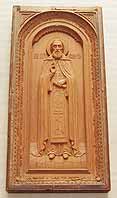
Khrustachev. Miniature icon. St. Sergius of Radonezh. Sergiev Posad. Late 19th century |
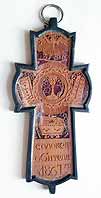
Monastic Cross. The Solovetsky Monastery. 1867.
|
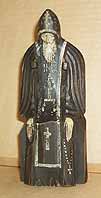
Sculpture. St. Nil Stolbensky. The Tver region. 19th century
|
The ivory icon “The Trinity” and folding icon “St. Sergius and Scenes from His Life”, carved by the Trinity novice Ivan Ilyin (monk Iona) in 1866, are unique works of that time. They are rare commissioned samples of miniature works. The folding icon was presented at the World Exhibition in Paris and returned with “ an honorable reference ”.
|
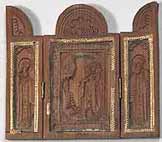
Folding icon. The Appearance of St. Nicholas to Dmitry Donskoi, SS. Sergius and Nikon of Radonezh. Sergiev Posad. 19th century |
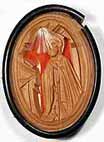
Miniature icon. St. Sergius of Radonezh offering a prayer. Sergiev Posad. 19th century |
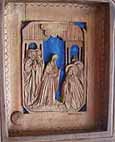
Miniature icon. The Appearance of the Virgin to St. Sergius of Radonezh. Sergiev Posad. 1869.
|
The collection of the 18th – 19th century miniature works in the Sergiev Posad Museum includes memorial items, as well as, “utilitarian” products like various crosses and pectoral panagias. Some Gospels and liturgical vessels are decorated with plaques with relief holy images carved in wood, mother-of- pearl or bone. A lot of objects are supplemented with precious mountings and inserted decorations. Many works are inimitable. Practically all of them are made by the best Russian craftsmen.
G.P. Cherkashina
|
|
|


